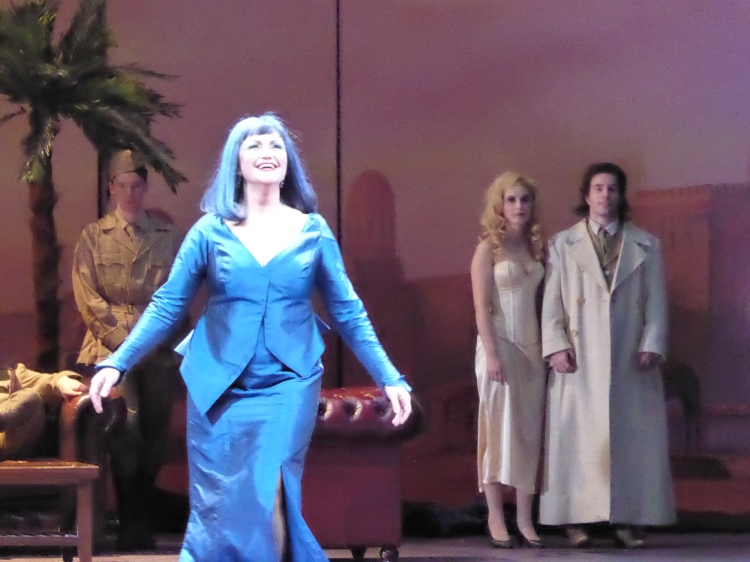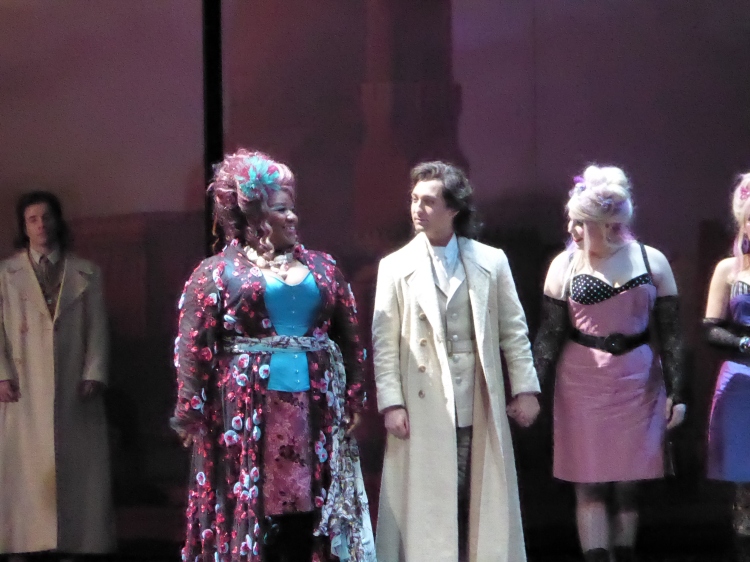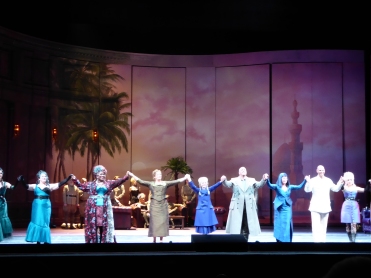The Egyptian Helena by Richard Strauss was unexplored territory for my operatic knowledge, and since I have decided to get immersion-type experience in Strauss-land over a weekend, I have not built up any biases to influence the perception of the performance. It was a wise move, as if all reading I have done after would have come before it, many things would not surprise me during the performance.
The downside of the first night of opera travel is quite typical – taking into account traditional late night combined with the early flight and a day filled with various activities at the destination, the evening comes with some fatigue, and that can be cured only with double espresso before a performance. My fault, I did forget about it, and rectified the mistake only at the interval.
Thus, the first part of the opera, which is intended as mythologically philosophical with participation of sorceress, elves, and omniscient mussel left me a bit confused and under impression that I have lost some part of the libretto or mixed up the story. Also, initially I have been confused about the geolocation of the main protagonist, – have I missed something at school and displaced Helena’s whereabouts during the legendary battle of Troy? as it turned out, not at all, and this is why sometimes it is important that you invest a bit more time and read beyond the synopsis about the intent of the authors and directors.
As it comes out, Egyptian Helena is mythological phantom created to rectify a problem of matrimonial fidelity, as well as to discover ways how our memory works – thus why we need to use palm potions of disillusionment and remembrance.
Strauss love for sopranos, especially spinto and lyrical type is also obvious in this opera, as most of the work consist of duets and only one exquisite solo aria by Helena in the beginning of Act 2. In that context it is very difficult to figure out who of the main characters is actually playing the central role, – either nominal protagonist Helena, exemplary sung and acted by Ricarda Merbeth, or charming, glistening Aithra, the role lived and sung by Laura Aikin vividly and enthusiastically.

Laura Aikin

Ricarda Merbeth, Ronnita Miller
Special mention of the night goes to the fantastic mussel by Ronnita Miller, her mezzo soprano has such a depth of fascinating lower register, combined with tender, mellow tone in middle and upper register, I was tempted to find out how she would interpret role of Azucena in Il Trovatore.

Ronnita Miller
Not to forget main protagonist of the opera – Menelas or Menelaus, sung by Stefan Vinke, and acted convincingly throughout the performance. Vinke has clear and strong voice, easily soaring above orchestra, and seems that particular score does not have any challenges for him, the tone was even, and top notes were delivered without forcing.

Stefan Vinke
All other cast members did a great job as ensemble, but most of the praise has to be issued to the orchestra of Deutsche Oper Berlin which was led by Andrew Litton energetically, conveying all nuances of the score and obviously well supporting the singers.
The staging needs special mention as again there has been smart use of the large rotating stage which allows moving through the story uninterrupted by scene changing and offers fluid transition from one part of imaginary world into another, as well described in the performance description on the company’s website:
The stage becomes a mirror at the point when the various levels of the protagonists’ lives – true-life present, traumatically survived past and escapist withdrawal from the world – intermingle and reveal the tragic dimensions of their mendacious game as represented by hell, ante-hell and deceptive paradise
It was a pleasure to learn that direction and sets are by Marco Arturo Marelli, since his production of Don Carlo a few years back in DOB impressed me tremendously and in fact became one of the turning points towards more intense opera exploration, – also this time both Reggie and sets are exceptionally well done, supporting complicated libretto and music interaction in this messy, mythologically philosophical essay of family values.

Richard Strauss (1864 – 1949)
Opera in two acts by Richard Strauss
Libretto by Hugo von Hofmannsthal
First performed on 6th June, 1928 in Dresden
Premiered at the Deutsche Oper Berlin on 18th January 2009
Cast
conductor Andrew Litton
director, stage-design Marco Arturo Marelli
costume-design Dagmar Niefind
chorus-master William Spaulding
Helena Ricarda Merbeth
Menelas Stefan Vinke
Aithra Laura Aikin
Altair Derek Welton
Da-Ud Andrew Dickinson
first servant of Aithra Alexandra Hutton
second servant of Aithra Stephanie Weiss
first elf Elbenita Kajtazi
second elf Alexandra Ionis
third elf Rebecca Raffell
the omniscient mussel Ronnita Miller
choir Chor der Deutschen Oper Berlin
orchestra Orchester der Deutschen Oper Berlin



mukul chand
Great Post
LikeLike
antrazalite
Thank you!
LikeLiked by 1 person
mukul chand
welcome
LikeLike